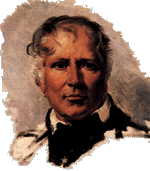SAINT CYR, Laurent Gouvion |
|
 | Por Marc Morillon |
![]() Laurent Gouvion Saint Cyr: Nacido en Toul (Lorraine) en 1764. Fue actor y pintor hasta que se alistó en 1792 como voluntario a un batallón en París. Lo nombraron alférez ese mismo año y luchó con la Armée du Rhin. Ascendido a general de brigada y posteriormente, en 1794, general de División, cuando contaba con 30 años de edad. Estuvo en el barrio de Mayence en 1795 y tomó parte en un gran número de acciones de la Armée du Rhin hasta 1798. Su breve estadía en la Armée de Rome en 1798, resulta con las victorias en Bosco y Novi. Regresó a Alemania en 1800, donde de nuevo vence en Biberach y Erbach; en 1801 se hace cargo de los ejércitos francés y español contra Portugal. Durante un corto periodo ejerce de embajador de Francia en España.
Laurent Gouvion Saint Cyr: Nacido en Toul (Lorraine) en 1764. Fue actor y pintor hasta que se alistó en 1792 como voluntario a un batallón en París. Lo nombraron alférez ese mismo año y luchó con la Armée du Rhin. Ascendido a general de brigada y posteriormente, en 1794, general de División, cuando contaba con 30 años de edad. Estuvo en el barrio de Mayence en 1795 y tomó parte en un gran número de acciones de la Armée du Rhin hasta 1798. Su breve estadía en la Armée de Rome en 1798, resulta con las victorias en Bosco y Novi. Regresó a Alemania en 1800, donde de nuevo vence en Biberach y Erbach; en 1801 se hace cargo de los ejércitos francés y español contra Portugal. Durante un corto periodo ejerce de embajador de Francia en España.
Durante el I Imperio y hasta 1812, no sirvió en la Grande Armée, porque Napoleón lo consideraba un acérrimo republicano. En el norte de Italia, en 1805, derrota al Príncipe de Rohan en Castelfranco. Después en Napies hasta 1806. En 1808, ya como comandante en jefe del Ejército en Cataluña, vence en Rosas, Cardedeu, Molins de Rey y Valls. En 1809 fue deshonrado después de haber huido sin esperar por quien sería su sucesor, Augereau.
Durante la campaña de Rusia, en 1812, es el jefe de los cuerpos bábaros y derrota a Wittgenstein en Polotsk y es nombrado Mariscal del Imperio. Algunos meses después, es herido durante la segunda batalla de Polotsk.
Defensor de Dresde en 1813, fue capturado y hecho prisionero de guerra en Austria hasta 1814.
Tras su regreso no toma parte en ninguna campaña en 1815. Fue nombrado ministro de Marina y más tarde ministro de la guerra.
En 1818 legisla la Ley de Reclutamiento, que aún hoy lleva su nombre.
Los últimos diez años de vida, los dedicó a la agricultura y a escribir sus memorias, muriendo en Hyères (La Provenza) en 1830.
![]()
![]()
Laurent Gouvion Saint Cyr
was born in 1764 in Toul (Lorraine). He was at first an actor and a painter. Enlisted in 1792 in a volunteer battalion in Paris, he was named commissioned officer the same year and fought with the Armée du Rhin. General de brigade, then general de division in 1794 as he was thirty years old. He was in the neighbourhood of Mayence in 1795 and take a part in the numerous fights of the Armee du Rhin until 1798. After a short stay in the Armee de Rome in 1798, he was victorious at Bosco and Novi. Returned in Gremany in 1800 and was victorious at Biberach and Erbach. In 1801 he was the commander of the French and Spanish armies against Portugal. He was for a short time ambassador of France in Spain. During the first Empire and until 1812, he was never employed with the Grande Armée: Napoleon knew him as a fierce republican. He was in the north of Italy in 1805 and defeated the Prince of Rohan at Castelfranco. Then in Naples until 1806. In 1808 he was the commander in chief of the Army of Catalonia and was victorious at Rosas, Cardedeu, Molins del Rey, Valls. In 1809 he was disgraced after have gone away without waiting his successor, Augereau. In 1812, during the campaign in Russia, he was the commander of the Bavarian corps and defeated Wittgenstein at Polotsk and was named Marechal of the Empire. Some months later he was wounded during the second battle of Polotsk. Defender of Dresde in 1813 he was captured and retained as prisoner of war in Austria until 1814. After his return he took no part in the 1815 campaign. He was named minister of the Navy and then minister of the war. In 1818 he was the author of the law of conscription which keeps his name nowadays. He spent the ten last years of his life with agriculture and writing his memoires. He died in Hyères (Provence) in 1830.